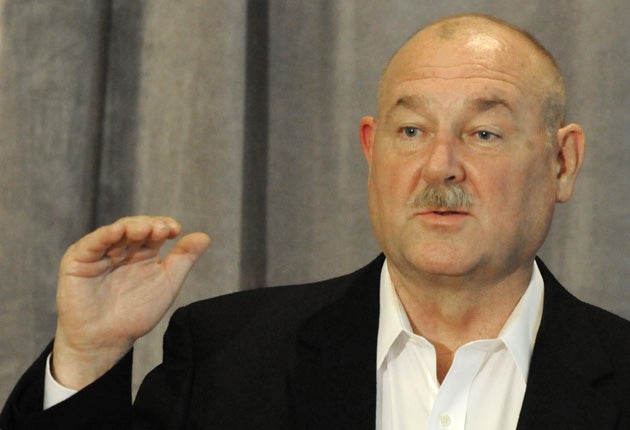As Cameron flies in, US declares ceasefire with BP – for the time being

Calls from a group of US senators for a meeting with David Cameron to discuss their concerns about the release of Lockerbie bomber Abdelbaset al-Megrahi have been rejected by the Prime Minister. A Downing Street source said the schedule for his two-day US visit was too tight to accommodate their request.
The issue Megrahi's release, which has come to the fore as anger grows over the Gulf of Mexico oil spill, is set to cast a shadow over Mr Cameron's first trip to the US. The environmental disaster is certain to be discussed during his meeting with President Obama today, while the Prime Minister is also likely to face questions during separate talks with Congressional leaders about suspicions that BP lobbied for Megrahi's transfer to Libya last year to protect its oil interests in the country.
The furore over the spill shows no signs of abating despite BP's announcement last week that it had stemmed the flow of oil into the Gulf. The company was yesterday told by the US authorities that it would be allowed to keep the experimental cap on its blown-out well for a fourth successive day despite signs of seepage after it promised to closely monitor the surrounding seabed to head off a potentially devastating new leak of oil and gas.
The extension signalled an end – for the time being at least – to apparent differences between the company and retired Coast Guard Admiral Thad Allen, the official in charge of the federal government's response, over the reliability of the cap in halting the three-month old disaster. Although the device has staunched the flow of oil since it was first put into operation last Thursday, unexpectedly low pressure readings inside the damaged well suggested oil and gas might be leaking out elsewhere, raising the spectre of an even more uncontrollable spill.
On Sunday evening, Adm Allen disclosed that a leak had been detected on the sea floor, a mile below the surface and reportedly two miles distant from the well itself. Though he did not specify what was leaking, or in what quantity, he ordered BP to provide more detailed information on its monitoring procedures.
The company's assurances seem to have quelled Washington's concerns for now. But the to-ing and fro-ing set investors fretting with BP shares, which have rallied over the past three weeks, dropped as much as five per cent on the seepage fears.
It was still unclear last night how long the cap – the first real piece of good news for Gulf businesses, residents and wild life since the 20 April blow-out – would stay in place. "Clearly, we want this to end," Carole Browner, the White House's top energy policy adviser, said. "But we don't want to enter into a situation where we have uncontrolled leaks all over the Gulf floor."
Whatever the differences on tactics, everyone agrees the ultimate solution lies with the two relief wells BP is drilling. Work on the first has advanced to the point where the company expects it to intercept the broken well, deep below the sea floor, before the end of this month. The original well will then be permanently sealed with mud and cement, a process that could take weeks.
Even once the leak is permanently plugged, it will take months, or possibly years, for the Gulf to recover. Somewhere between 94 million gallons and 184 million gallons have spilled into the waters since the Deepwater Horizon rig exploded, killing 11 people and touching off one of America's worst environment crises.
Meanwhile, BP has announced that the cost of dealing with the spill had risen to nearly $4bn (£2.6bn), including $207m paid to settle individual claims for damages. Thus far, 116,000 claims have been submitted and more than 67,500 payments made, the company said.
Join our commenting forum
Join thought-provoking conversations, follow other Independent readers and see their replies
Comments